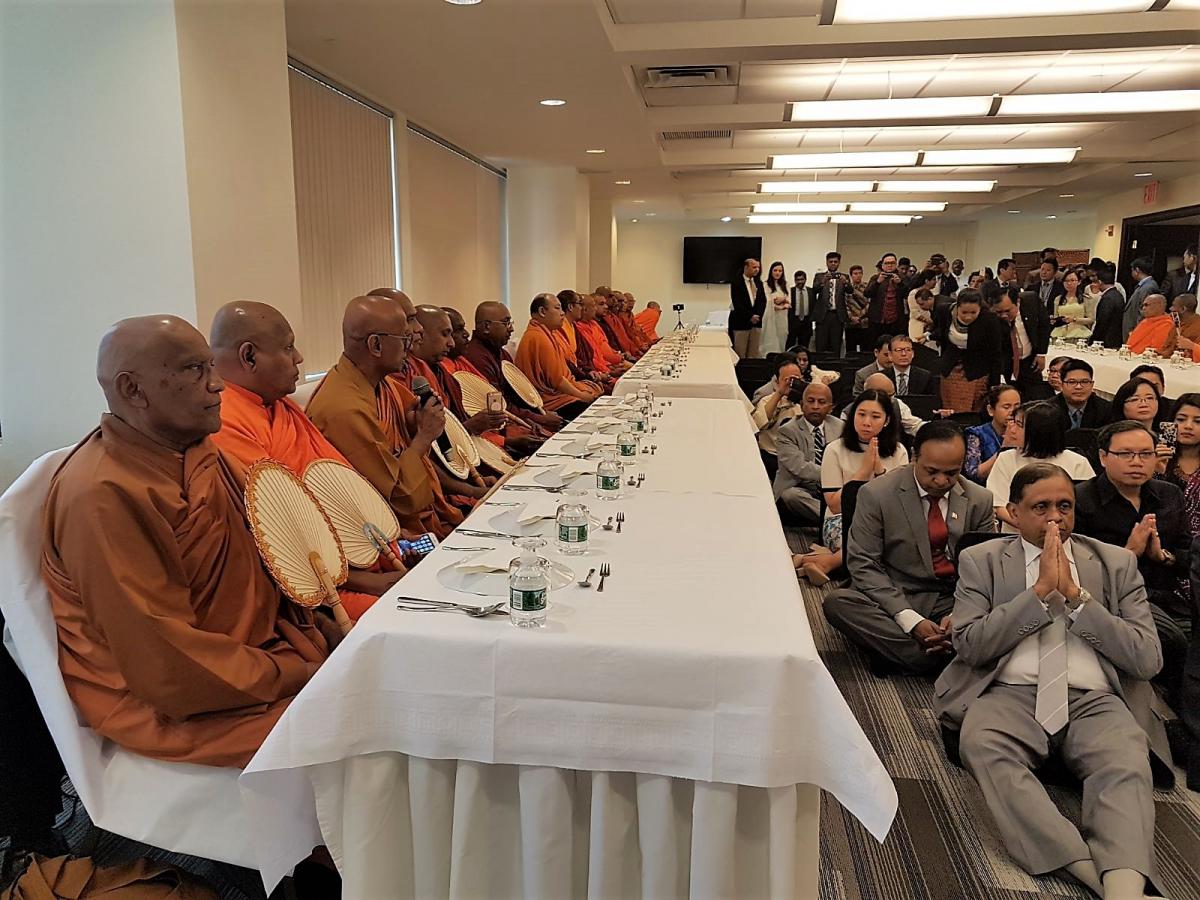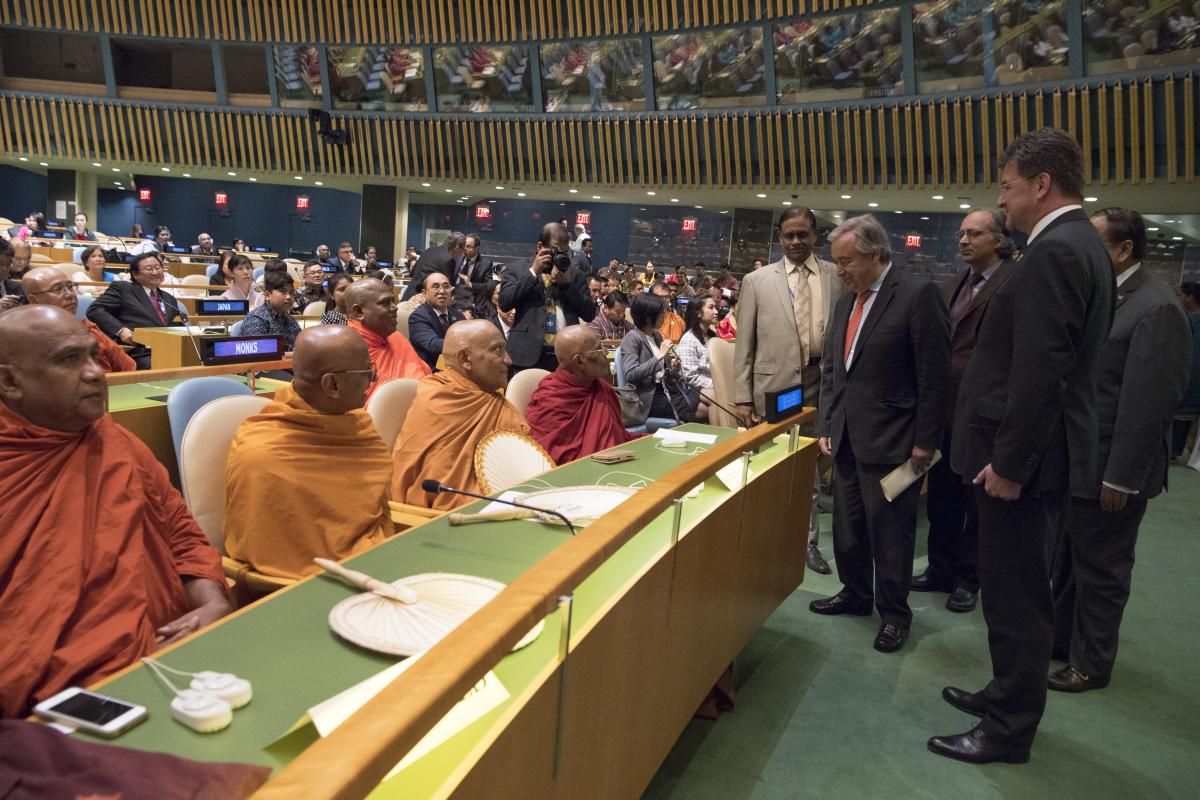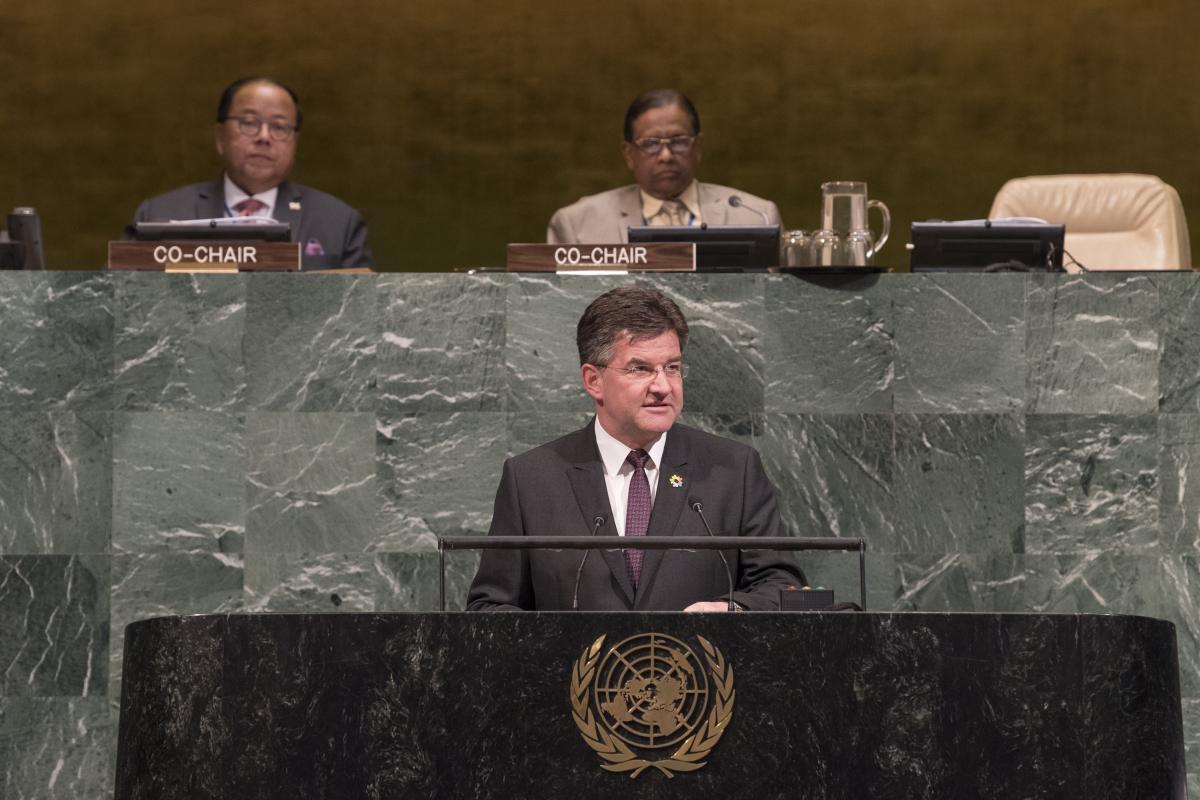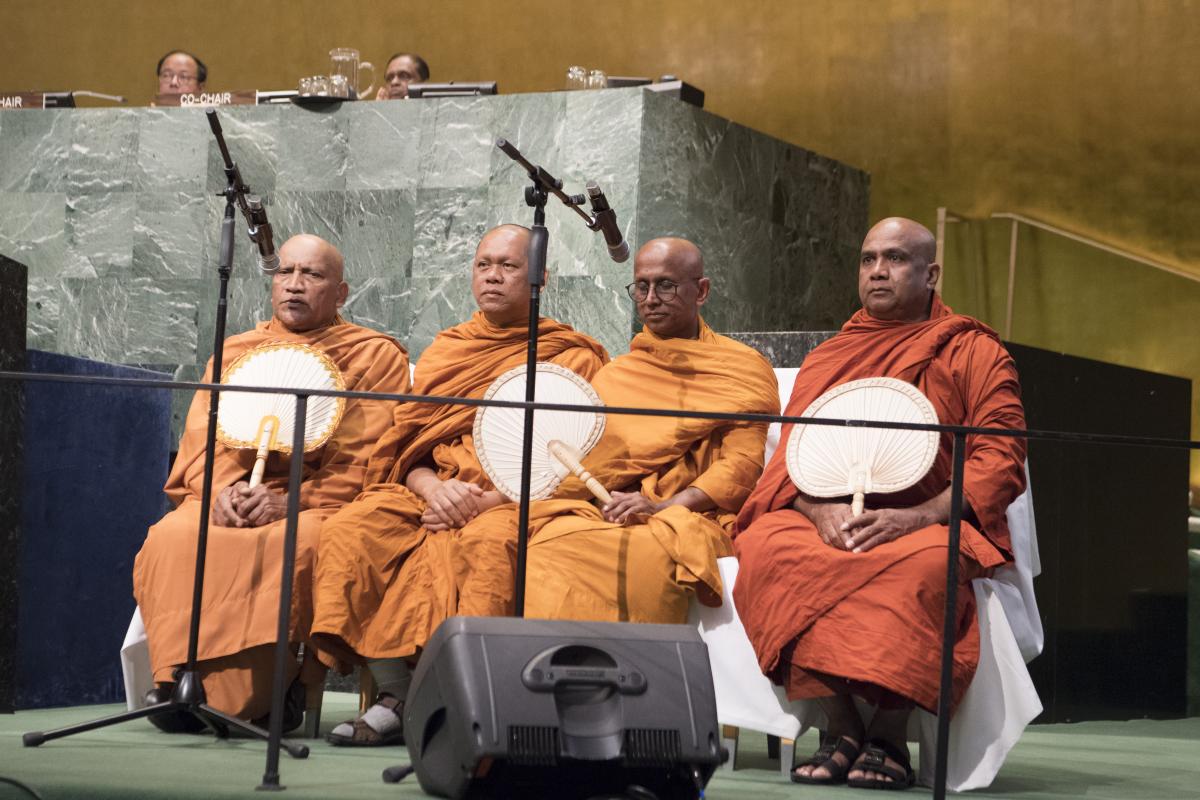Mr. António Guterres, United Nations Secretary-General (UNSG) speaking during the annual commemoration of Vesak at the United Nations Headquarters in New York yesterday (01 May 2018), noted that, although born a prince, Buddha rose above self-interest and went into the world to help overcome human suffering. “His teachings are based on the principle that compassion is central to enlightenment, and as such, his message of service to others is more relevant than ever,” the Secretary-General said. (UNSG’s full remarks can be found below).
The United Nations Day of Vesak was celebrated in New York May 1 in accordance with UN General Assembly resolution 54/115 recognizing the day of Vesak internationally as the most significant day for Buddhists all over the world. The Permanent Mission of Sri Lanka to the United Nations in New York along with the Permanent Mission of Thailand took the lead in organizing this years’ commemoration, together with other states co-sponsoring the resolution in 2000. 
The celebrations commenced on the morning of May 01 with a dāna offered to over forty Buddhist monks representing Sri Lanka, Thailand, Myanmar, Cambodia, Indonesia, Laos, and the Republic of Korea, at the Sri Lanka Mission premises. Sri Lanka’s Permanent Representative to the United Nations Ambassador Dr. Rohan Perera and senior diplomats from Thailand, Cambodia, India, Indonesia, Myanmar, Laos, Bhutan, Nepal and Republic of Korea attended the ceremony and offered dana to the Maha Sangha. A number of lay persons, including the staff of these countries were also present. Ven. Heenbunne Kondanna Thero, Chief Incumbent of the Staten Island Buddhist Vihara in New York conducted the religious ceremony.
A solemn event to mark the Day of Vesak, co-chaired by Ambassador Dr. Rohan Perera and Ambassador Vitvihas Srivihok, Permanent Representative of the Kingdom of Thailand to the United Nations was held in the evening of 1st May from 6.30 to 8.30 p.m. at the United Nations General Assembly hall. A large number of Buddhist monks representing many countries, President of the General Assembly H.E. Mr. Miroslav Lajčák, UN Secretary-General H.E. Mr. António Guterres, Permanent Representatives of Member States, senior diplomats, senior UN officials, staff of the Permanent Missions and the UN Secretariat, and communities from various countries attended this solemn event.
Ambassador H.E. Dr. Rohan Perera delivered the opening remarks, highlighting the significance and relevance of the message of Buddha in addressing contemporary problems that affect the world today. Dr. Perera noted that, despite our best efforts, we are confronted with unprecedented challenges in the global order. In identifying the root causes of these conflicts, Dr. Perera referred to the Buddha’s teaching which states that “wrong views” are the reasons behind the challenges we face, and in order to tame these views, underlined the need to adopt “Samma Ditti” or right views within ourselves. (His full remarks can be found below.)
The President of the General Assembly (PGA) in his brief statement highlighted three principles from the teachings of the Buddha which are sources of guidance to the activities of the United Nations; firstly, “the middle way”, secondly metta (friendship) and karuna (kindness), and lastly the fundamental equality of people. He further noted that these same values are enshrined in the Charter of the United Nations. Mr. Lajčák concluded by saying that while the United Nations was not born of any religion, these timeless principles remain important to its work and that they “shine a light on the path to peace – peace among nations, and peace within people.” (His full remarks can be found below.)

H.E. Mr. Miroslav Lajcak, President of the General Assembly, delivers remarks at the commemoration of the Day of Vesak in the General Assembly Hall
H.E. António Guterres, Secretary-General of the United Nations, paid reverence to the birth, enlightenment and parinirvana of the Buddha and emphasized the inspiration found in his message of service in order to become global citizens. Mr. Guterres stated that the Buddhist world view teaches us to see ourselves as a part of this world and not its masters, and Buddhism’s “emphasis on non-violence stands as a powerful call for peace.” He concluded by referring to the focus in Buddhism on the inherent dignity of life which finds resonance today in the 2030 Agenda for Sustainable Development.

Secretary-General of the United Nations, H.E. Mr. Antonio Guterres, speaks a few words at the Vesak Commemoration held at the United Nations
Following the remarks by the PGA and UNSG, the five precepts were chanted by the maha sangha of the Theravadha tradition and blessings were invoked by the venerable monks of the Mahayana tradition.
A sermon was delivered by a scholar monk, Bhante Henepola Gunaratana, who is the founding abbot of the Bhavana Society, West Virginia and Chief Sangha Nayaka Thera for North America. In his sermon, said the Buddha identified the global problem of humanity as “universal suffering”, with the root causes of this suffering being greed, hatred and conflict within ourselves. He called upon all to practice Metta to rid ourselves of these feelings, and said that the teachings of the Buddha can only be found in the hearts and minds of the people.

The sermon was followed by a devotional song, ‘Himi Sanaramara’, performed by Visharadha Shalika Aroshini.
Representatives of Bhutan, Bangladesh, Cambodia, India, Indonesia, Japan, Malaysia, Norway, Russia, Singapore, and Vietnam among others addressed the General Assembly reflecting on the significance of the Day of Vesak.
The event was followed by a dhansala or distribution of alms in the lobby of the General Assembly Hall to all those who were in attendance.
Permanent Mission of Sri Lanka to the United Nations
New York
1st May 2018
Opening Remarks by H.E. Dr. Rohan Perera, Ambassador and Permanent Representative of Sri Lanka, on the occasion of the Day of Vesak 2018
The Most Venerable Members of the Maha Sangha
H.E. Mr. Miroslav Lajčák, President of the General Assembly
H.E. Mr. António Guterres, Secretary General of the United Nations
Distinguished Co-Chair H.E. Mr. Vitavas Srivihok, Ambassador and Permanent Representative of Thailand
Excellencies,
Distinguished delegates,
Ladies & gentlemen,
It is a great honour and a privilege for me to extend a warm welcome to you and to address you on this very solemn occasion as we observe Vesak in the United Nations. We are all aware of its significance, as it commemorates the birth, the enlightenment and the mahaparinirwarna of Lord Buddha.
As we gather here today, in this historic General Assembly hall of the United Nations, it is an apt occasion to reflect on the true significance and the continuing relevance of the message of the Buddha, in addressing the contemporary problems that affect the world we live in today.
The grim reality is that, despite our best efforts, we are confronted with unprecedented challenges in the global order. The world continues to be plagued by violent conflicts, poverty, hunger and disease. These are troubled times in which humanity is confronted by mutual distrust, hatred and increasing isolationism. Rising international tensions and the spectre of terrorism and violent extremism spreading across national frontiers, are threatening to tear apart the very fabric of human security and jeopardize our collective quest for peace.
In finding answers to these phenomena one must examine deeply the root causes of such violent conflicts and rising tensions. According to the Buddha’s teachings, the root cause for violence, unhappiness and suffering is caused by “wrong views” born out of greed, hatred and delusion, within undisciplined and untrained minds. Such thoughts are permeating not only the present global order but also within States themselves, extracting a heavy toll in terms of human suffering, with catastrophic consequences for humanity.
In the Anguttara Nikaya (Chap 1, Verse 27), the Buddha states that there is no single factor so responsible for suffering as the wrong view of the undisciplined mind.
"I don't envision a single thing that, when undeveloped & uncultivated, leads to such great harm as the mind. The mind, when undeveloped & uncultivated leads to great harm."
Accordingly, in order to confront the violence in society and the world around us, we must first tame the “wrong views” within ourselves and adopt “Samma Ditti” or the right views. It is these “right views” that lead to ‘right deeds”, as our inner peace is reflected in our actions. As our inner and outer worlds remain interconnected, by healing oneself, we can heal society and create a global community of peace.
Let me quote from the Preamble of the Constitution of UNESCO, which states:
Since wars begin in the minds of men, it is in the minds of men that the defences of peace must be constructed".
Disarmament of the mind, therefore, remains key to world peace. It is also apt to recall in this context, the words of advice Buddha had given to the Lichchhavis, a ruling class during his time. To them he emphasized as the core of governance, the need to meet in harmony, discuss in harmony and rise in harmony” –
one of the earliest recorded illustrations of the idea of consensus building and democratic governance being conceptualized. It needs no emphasis that these are the same principles we are attempting to adhere today within the United Nations – Principles of Justice, Rule of Law, Good Governance for the greater good of all humanity.
Venerable Maha Sangha,
Excellencies,
Ladies and Gentlemen,
The Buddha’s message to the world was to create a society that embodies peace and harmony, justice and equality. It is a message that resonates even today, as it did 2,500 years ago. And on this Vesak Day, may the “right view” guide us to create a just, free and peaceful world for all beings.
Theruvan Saranai!
May the Triple Gem Bless you!
Statement by H.E. Mr. Miroslav Lajcak, President of the 72nd Session of the General Assembly, at Commemoration of the International Day of Vesak
Mr. Secretary-General, Excellencies, Ladies and gentlemen,
I am pleased to join millions around the world in celebrating International Day of Vesak. I thank the Missions of Sri Lanka and Thailand for organising this commemoration at the United Nations.
This day we remember the Buddha’s birth, enlightenment and passing. And, his teachings. Because they remain a source of inspiration and guidance. And for us, here, at the United Nations, many of these principles are more appropriate than ever.
And I want to highlight three that we must think specially about now.
The first is on “the middle way”. The Buddha knew both: a life of extravagance and a life of want. He stressed that the extremes were not the way to enlightenment. Instead, he taught that moderation was the required path: the middle way.
And in so many areas of our own work, we see this played out again and again. Red lines and hard positions. Extreme views and perspectives. But, when we meet each other in the middle, we make genuine progress.
This is the essence of diplomacy, of multilateralism. We even see this middle way reflected in one of our Sustainable Development Goals – on sustainable consumption and production.
I encourage us all of us to choose the middle way more often.
The second is embodied in the Dhamma – metta and karuna. The Buddha taught that loving kindness and compassion are essential. All living things are connected. And one’s well-being depends on the well-being of all.
I can see this replicated in our common quest to uphold human dignity; our commitment to sustainable development; and our work to promote peace.
Indeed, it is accepted that we must reach the most vulnerable and leave no one behind. This teaching of the Buddha serves as a constant reminder of why we do what we do.
And last, the fundamental equality of all people. The Buddha taught that the journey to enlightenment was open to all. Regardless of status, or circumstances, or characteristics.
These same values are enshrined in our Charter. Non-discrimination and inclusivity are fundamental principles by which we work to meet our ambitious goals. And that is why we must reinforce them every day, everywhere.
Excellencies, Ladies and gentlemen,
The United Nations was not born from any religion – no. However, these timeless principles remain important, to the work we do, in these Halls.
They offer insights and ideals on improving the condition of the planet; they show us the way to a more sustainable future. They remind us to recognise the inherent dignity of all people. They shine a light on the path to peace – peace among nations, and peace within people.
Now, we confront challenges as a global community. The message of Vesak reminds us to overcome them through solidarity. And I trust we will all act on these truths.
I wish you a Happy Vesak Day.
Thank you.
Statement by H.E. Mr. Antonio Guterres, Secretary-General of the United Nations, on the occassion of the International Day of Vesak
Excellencies,
Ladies and gentlemen,
Dear guests and friends,
I am pleased to join you in celebrating Vesak, a day that is sacred for millions of Buddhists around the world.
As the President of the General Assembly just mentioned, we mark the birth, enlightenment and passing of the Buddha. And on this occasion, Buddhists and non-Buddhists alike can reflect on his life and draw inspiration from his teachings.
Born a prince, he rose above self-interest and went into the world to help overcome human suffering. His teachings are based on the principle that compassion is central to enlightenment.
And as such, his message of service to others is more relevant than ever.
The world faces numerous challenges, from conflict to climate change, from prejudice to growing inequality.
We see people turning inwards.
And we see a crisis of solidarity.
The Buddha’s teachings can inspire us to become global citizens. And the focus in Buddhism on the inherent dignity of life finds resonance today in our 2030 Agenda for Sustainable Development.
The Buddhist world view teaches us to see ourselves as a part of this world and not as its masters. And Buddhism’s emphasis on non-violence stands as a powerful call for peace.
From peace, to climate change, to human rights, we see how much the teachings of the Buddha are so relevant in the work of the United Nations today.
Now more than ever, Buddhist communities and all of us must give every day meaning to the Buddha’s message of tolerance, empathy and humanism.
We must resist those who seek to twist a call for love into a cry for hate.
And on this Day of Vesak, let us renew our commitment to bridge differences, care for the most vulnerable and truly leave no one behind as we navigate the path to a better future for all.
Thank you.


